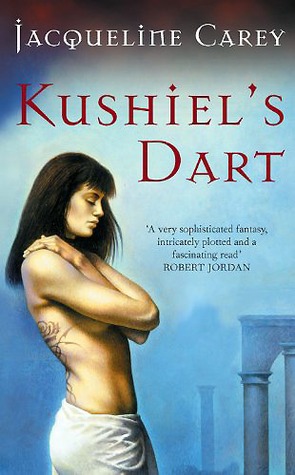Kushiel’s Dart by Jacqueline Carey isn’t for everyone. Be forewarned that the main character is a prostitute, BDSM is her specialty, and there are lots of explicit sex scenes. That didn’t bother me, but it can be pretty divisive.
In an alternate history Europe, Mary Magdalene and Christ have a child by magic. Their son Elua wanders the earth with some fallen angel disciples, preaching free love, and eventually settles in alternate France. The religions of this Europe are a mishmash of free-love-utopia, paganism, and regular Christianity, whose followers live in the “Yeshuite Quarter” of the city and are mistrusted at best.
Phèdre, a holy prostitute in training, gets the opportunity one day to also become a spy. Clients talk when they let their guards down. This book is her bildungsroman.
It takes a long time to get going. I recommend you muscle through the first few dozen pages or so until Phèdre starts plying her trade for real. It gets better.
The book’s at its best when Carey examines what a free-love-utopia might actually look like. She handles the touchy subject of prostitution with subtletly. The practice isn’t glorified or vilified. It’s a career, with all the day-to-day gripes that go with it.
Carey has the fortitude to poke her notion of utopia full of holes, too. Do the characters really “love as they wilt,” as Elua commands them to? How willingly taken is the vow of sacred prostitution when the prostitutes are sold into the temple’s service at a very young age? What about the nobility, who have to marry for political reasons? What happens if people with incompatible sexualities fall in love with each other?
The sex didn’t shock me. It did send my eyes rolling sometimes. No, they wouldn’t have been able to do that. Not that many times in one evening! Other characters get pregnant by accident, but not Phèdre for some reason, and STDs are mysteriously nowhere to be seen.
The alternate history aspect of the novel was a mixed bag for me. On the one hand, a magical being controls the English Channel and doesn’t let most people through. An alternate Britain that never had a Norman Conquest is pretty cool. You’re thrown into a world that’s halfway between Beowulf and the Mabinogion yet strong enough to be an (almost) equal partner to alternate France.
But alternate Germany didn’t make any sense. That region of Europe in our world has been alternately impressing or terrifying its neighbors with technology since the Renaissance. It brought us the printing press, modern chemistry, and rocket science and in Phèdre’s world they’ve been reduced to Orcs. The only reason they present any threat at all to France is they found a leader with two brain cells to rub together and there are a lot of them. The changes to Britain make sense because of the isolation, but there’s no explanation given for the Germans.
Worse, the book can tread into some pretty unfortunate territory. The D’angeline (French) people are inherently more awesome than their neighbors because of their ethnic background, which contains angel blood. It gets to the point where the German savages are awestruck by Phèdre and her companion just by looking at them. Phèdre describes non-D’angeline people as “like children” on two separate occasions.
Should you read this book? If it’s your thing, sure. If it’s not, don’t worry about it.

